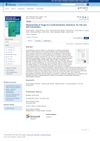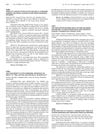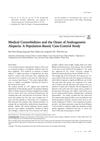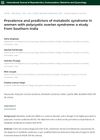 1 citations,
January 2017 in “Przegla̧d dermatologiczny”
1 citations,
January 2017 in “Przegla̧d dermatologiczny” People with more than 11 skin tags, especially on the thigh, neck, or armpit, may have a higher chance of metabolic syndrome.
 January 2023 in “Hormone and Metabolic Research”
January 2023 in “Hormone and Metabolic Research” Existing drugs are being repurposed to treat cardiometabolic disorders, which is safer, faster, and cheaper than developing new drugs.
 27 citations,
March 2018 in “Fertility and Sterility”
27 citations,
March 2018 in “Fertility and Sterility” Women with PCOS who had antiandrogenic treatment before pregnancy had fewer complications than those without treatment.
 21 citations,
February 2021 in “BMJ case reports”
21 citations,
February 2021 in “BMJ case reports” Anabolic steroid users may face higher risk of severe COVID-19.
 17 citations,
May 2012 in “Clinical Endocrinology”
17 citations,
May 2012 in “Clinical Endocrinology” Surgery to lower high testosterone in postmenopausal women with certain ovarian tumors doesn't significantly affect their metabolism.
 14 citations,
August 2021 in “Diabetes, Metabolic Syndrome and Obesity: Targets and Therapy”
14 citations,
August 2021 in “Diabetes, Metabolic Syndrome and Obesity: Targets and Therapy” Metformin, a diabetes drug, may help prevent and treat various cancers, but more research is needed.
 12 citations,
August 2017 in “Pharmaceutical medicine”
12 citations,
August 2017 in “Pharmaceutical medicine” Most doctors know the thrombosis risk with Cyproterone/Ethinylestradiol, but some lack details on less common risks and patient instructions; educational materials are underused but useful.
 10 citations,
December 2015 in “Clinics in Dermatology”
10 citations,
December 2015 in “Clinics in Dermatology” Diabetes can lead to blindness and skin problems, and managing blood sugar and blood pressure is crucial to prevent these complications.
 March 2024 in “PLoS medicine”
March 2024 in “PLoS medicine” Physical activity, height, and smoking affect prostate cancer risk.
 June 2003 in “Obstetrical & Gynecological Survey”
June 2003 in “Obstetrical & Gynecological Survey” After chemotherapy for a gestational trophoblastic tumor, normal pregnancy rates are possible, but there's a slightly higher risk of the tumor reoccurring in future pregnancies.
 68 citations,
September 2003 in “British Journal of Dermatology”
68 citations,
September 2003 in “British Journal of Dermatology” Shrinking skin cancer increases the chance of cancer in nearby lymph nodes.
 41 citations,
September 2014 in “Journal of Pharmacy and Pharmacology”
41 citations,
September 2014 in “Journal of Pharmacy and Pharmacology” Melatonin may help treat PCOS symptoms in rats.
 38 citations,
February 2009 in “Journal of The European Academy of Dermatology and Venereology”
38 citations,
February 2009 in “Journal of The European Academy of Dermatology and Venereology” Severe vertex pattern hair loss may indicate a higher risk for artery plaque buildup.
 28 citations,
October 2007 in “PubMed”
28 citations,
October 2007 in “PubMed” Low iron levels are linked to more hair loss in non-menopausal women.
 20 citations,
August 2016 in “International Journal of Cancer”
20 citations,
August 2016 in “International Journal of Cancer” Men with male pattern baldness have a higher risk of certain skin cancers, especially on the scalp.
 11 citations,
January 2008 in “International journal of environment and health”
11 citations,
January 2008 in “International journal of environment and health” Children are at risk of health issues from exposure to platinum group elements from car exhausts.
 9 citations,
March 2018 in “International Journal of Cancer”
9 citations,
March 2018 in “International Journal of Cancer” Men with frontal male pattern baldness may have a higher risk of gastric cancer.
 September 2010 in “European Urology Supplements”
September 2010 in “European Urology Supplements” Serum triglyceride levels are not linked to prostate cancer risk.
 40 citations,
December 2016 in “Journal of Ovarian Research”
40 citations,
December 2016 in “Journal of Ovarian Research” Rutin may help treat symptoms of polycystic ovary syndrome (PCOS) in rats.
 12 citations,
March 2013 in “Cancer Causes & Control”
12 citations,
March 2013 in “Cancer Causes & Control” Early balding, especially frontal, increases prostate cancer risk; more research needed.
 12 citations,
September 2011 in “Archives of Dermatological Research”
12 citations,
September 2011 in “Archives of Dermatological Research” Policemen have more hair loss due to obesity, sunlight exposure, and stress.
 69 citations,
December 2005 in “Nature Clinical Practice Endocrinology & Metabolism”
69 citations,
December 2005 in “Nature Clinical Practice Endocrinology & Metabolism” Blocking the enzyme 11β-HSD1 might help treat obesity and metabolic issues.
 April 2012 in “The Journal of Urology”
April 2012 in “The Journal of Urology” Male pattern baldness may predict prostate cancer risk.
 2 citations,
January 2018 in “Annals of Dermatology”
2 citations,
January 2018 in “Annals of Dermatology” Early hair loss may be linked to metabolic syndrome.
 December 2021 in “The Journal of clinical endocrinology and metabolism/Journal of clinical endocrinology & metabolism”
December 2021 in “The Journal of clinical endocrinology and metabolism/Journal of clinical endocrinology & metabolism” Men can have genetic risks for PCOS-related traits like obesity and diabetes.
29 citations,
May 2016 in “Journal of the American Academy of Dermatology” Patients with alopecia areata might have a lower risk of stroke and possibly heart attack.
 6 citations,
January 2015 in “International journal of reproduction, contraception, obstetrics and gynecology”
6 citations,
January 2015 in “International journal of reproduction, contraception, obstetrics and gynecology” More than half of the women with PCOS in Southern India had Metabolic Syndrome, with large waist circumference being the most common feature.
 1 citations,
June 2023 in “Nutrients”
1 citations,
June 2023 in “Nutrients” Vitamin D deficiency is linked to a higher chance of metabolic syndrome in women with PCOS.
 December 2024 in “Livers”
December 2024 in “Livers” Recognizing rare causes of MASLD is crucial for effective treatment and preventing complications.
 111 citations,
October 2008 in “Nature Genetics”
111 citations,
October 2008 in “Nature Genetics” Researchers found a new gene area linked to male-pattern baldness, which, along with another gene, significantly increases the risk of hair loss in men.





























